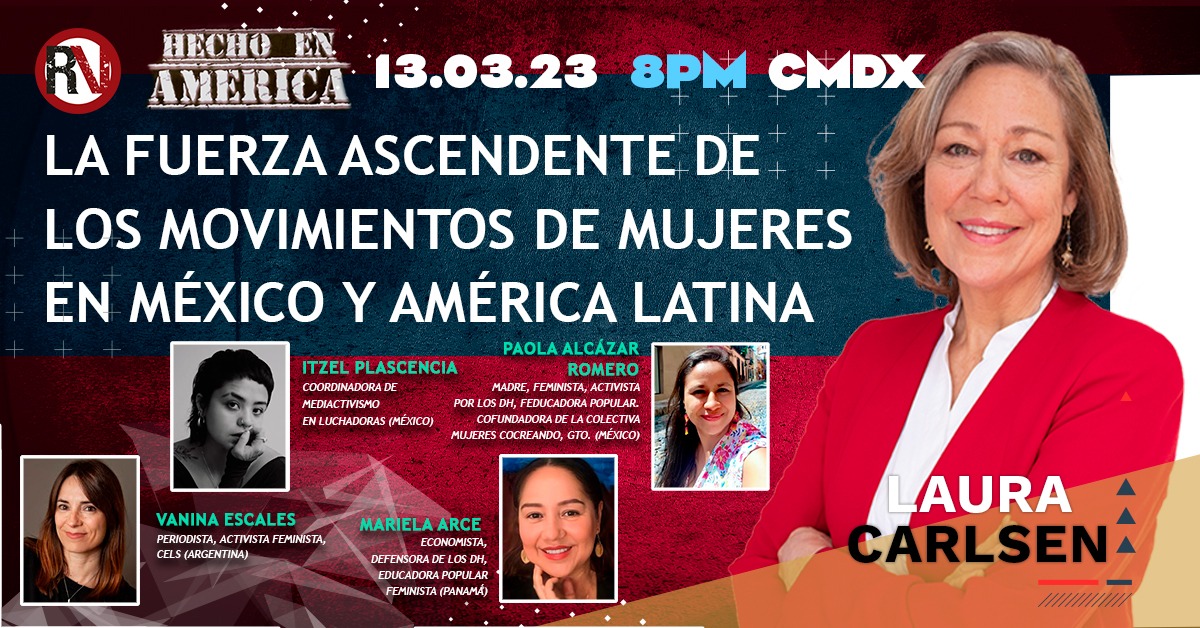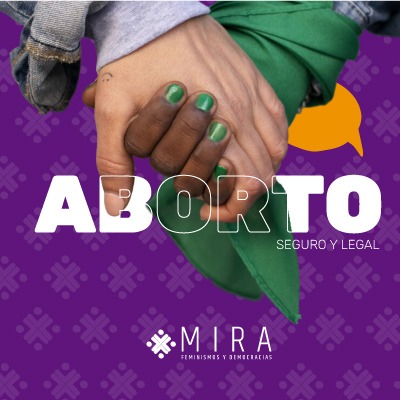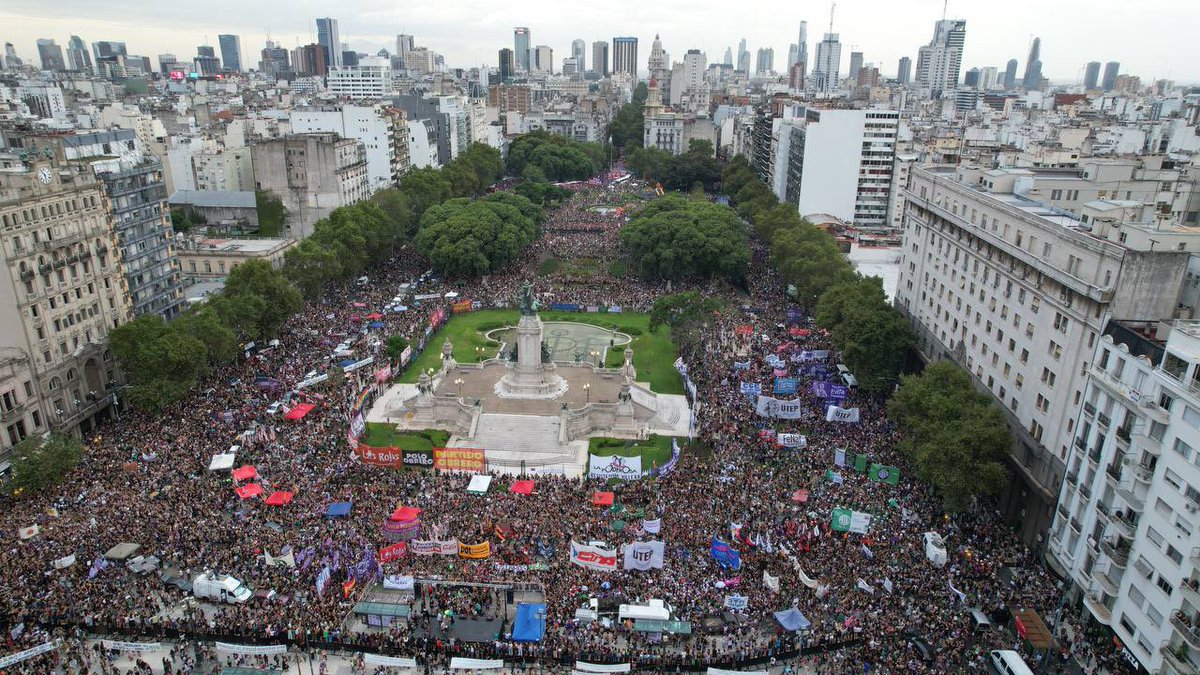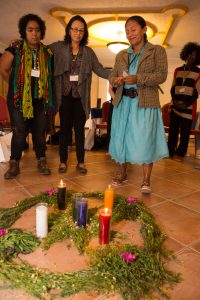 Women grassroots leaders and peace activists from across the Americas met in Antigua, Guatemala in early November to discuss the root causes of the violence they experience, major challenges to peace in the region, and what feminist grassroots leaders are doing about it. The “Strategic Dialogue on Women and Security: Building Peace in the Americas” laid out a grim panorama of violence across the region, while charting new paths to sustainable peace.
Women grassroots leaders and peace activists from across the Americas met in Antigua, Guatemala in early November to discuss the root causes of the violence they experience, major challenges to peace in the region, and what feminist grassroots leaders are doing about it. The “Strategic Dialogue on Women and Security: Building Peace in the Americas” laid out a grim panorama of violence across the region, while charting new paths to sustainable peace.
Twenty-five women from Mexico, Honduras, Guatemala, El Salvador, Puerto Rico, Cuba, Colombia and the United States–most from conflict areas–shared how they’re confronting violence against women and against their families and communities. The meeting pioneered a long-term goal to pool experiences, analyze challenges and find solutions among leading women peace activists at the regional level, with the aim of strengthening local organizing and generating a people-centered roadmap for security.
The dialogue was organized by the CIP Americas Program, with the Nobel Women’s initiative, the Women’s Regional Network and the Instituto de Filosofía. Representatives from the United States and its “territory” Puerto Rico participated to highlight that many parts of the United States suffer from violence that has many of the same characteristics as Latin America and community campaigns for peace and justice can find common ground there. The central role of U.S. government and corporations often surfaced in discussions on militarization and land grabs, presenting threats within and outside the country.
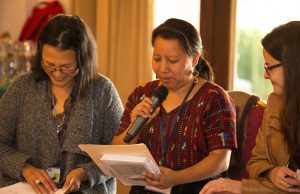 Over the course of the three-day event, Latin American women gained knowledge from each other and had the opportunity to learn from women who have dedicated their lives to peace-building internationally. A member of the four-person coordinating committee, Nobel Peace Prize winner Jody Williams, discussed her international activism for sustainable peace since becoming a Nobel Laureate and her experience in organizing the successful International Ban Land Mines Campaign. She emphasized how to start small and build out through other organizations, adopting a clear issue and adapting the work on it. She also emphasized the power of changing the way people look at issues. “Out of this work came a whole different way at looking at disarmament- we were able to transform it into humanitarian disarmament, resulting in multiple treaties,” she noted.
Over the course of the three-day event, Latin American women gained knowledge from each other and had the opportunity to learn from women who have dedicated their lives to peace-building internationally. A member of the four-person coordinating committee, Nobel Peace Prize winner Jody Williams, discussed her international activism for sustainable peace since becoming a Nobel Laureate and her experience in organizing the successful International Ban Land Mines Campaign. She emphasized how to start small and build out through other organizations, adopting a clear issue and adapting the work on it. She also emphasized the power of changing the way people look at issues. “Out of this work came a whole different way at looking at disarmament- we were able to transform it into humanitarian disarmament, resulting in multiple treaties,” she noted.
Women leaders from the Women’s Regional Network (WRN) of Pakistan, Afghanistan and India, traveled to Guatemala for the first time to describe the challenges and achievements of organizing regionally. Several years ago, they decided to transcend the confines of national conflicts to form a network of women from high-conflict zones in India, Pakistan and Afghanistan. Indeed, the South Asia Women’s Regional Network was the inspiration for the Latin American regional meeting. As described by Patricia Cooper, Swarna Rajagopalan from Chennai, Bushra Gohar of Islamabad, and Chelsea Soderholm who attended the Antigua Dialogue, by joining women from nations with histories of conflict and distrust among them, the WRN has been able to more clearly identify the deeper roots of conflict and the challenges they have in common. Working cross-border, the women have become a single voice for the region on the international level and in their countries.
Pakistani leader Bushra Gohar described how the group concentrated on 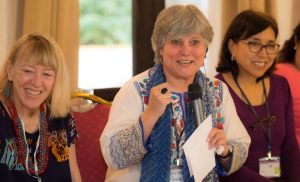 creating a forum for dialogue and analysis, choosing a central theme and then opening up discussions on the grassroots level. The WRN women underlined the importance of having a regional organization of women and for women; in the words of WRN member Swarna Rajagopalan of Chennai, “We women have such limited space, and so often women tend to give their spaces up—that’s what we do as women. You have to hold your ground and keep your space.” The WRN has produced key country and regional documents of analysis and documented processes of conflict and peace-building. Their model of “community conversations” with groups of women in conflict areas serves as the basis for building the agenda of the network and giving voice to women facing the brunt of many different kinds of conflict where many leaders have been lost to assassination and war.
creating a forum for dialogue and analysis, choosing a central theme and then opening up discussions on the grassroots level. The WRN women underlined the importance of having a regional organization of women and for women; in the words of WRN member Swarna Rajagopalan of Chennai, “We women have such limited space, and so often women tend to give their spaces up—that’s what we do as women. You have to hold your ground and keep your space.” The WRN has produced key country and regional documents of analysis and documented processes of conflict and peace-building. Their model of “community conversations” with groups of women in conflict areas serves as the basis for building the agenda of the network and giving voice to women facing the brunt of many different kinds of conflict where many leaders have been lost to assassination and war.
Participants at the Antigua meeting examined these crosscutting issues in small groups divided into a) militarization and corruption, b) discrimination and violence against women, and c) defense of land and territory. We also looked at specific proposals to link women working within and across borders for joint advocacy, specific campaign, rapid response and mobilization for peace and justice. The Dialogue ended with sharing the successful strategies that women and their organizations have developed and implemented over the years in conflicts as seemingly disparate as inner-city New York and a Mayan village’s resistance to mining.
…the conflicts we face in our countries don’t register on international lists of armed conflict, despite the fact that they are heavily armed, territorial and deadly.
Some Lessons
Non-traditional forms of conflict often go unrecognized, unaddressed and misunderstood, but they affect women’s and children’s lives profoundly. One of the first problems we identified is that the forms of violence we face are generally not recognized formally as conflicts since they don’t form part of declared nationalist or civil wars. The war on drugs, gang violence, state violence and conflicts over land and territory have deep historical and cultural roots in our cities and communities and 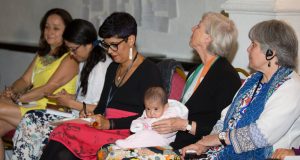 often times cause as much death and displacement as conventional wars–or more. However, with the exception of Colombia’s civil war, these conflicts don’t register on international lists of armed conflict, despite the fact that they are heavily armed, territorial and deadly.
often times cause as much death and displacement as conventional wars–or more. However, with the exception of Colombia’s civil war, these conflicts don’t register on international lists of armed conflict, despite the fact that they are heavily armed, territorial and deadly.
The conflict is not out there on a battlefield—it’s in our homes and our bodies. A second challenge is that since these conflicts affect ourselves, our homes, and our families, they are not just something you read about in the newspaper, but rather a fact of daily life. “The conflict is injected in our veins,” said one woman of the Black Communities Process among Afro-Colombian communities on the Pacific Coast of Colombia. In communities fighting to defend their territory from corporations in Honduras, to battles for clean water in mining villages in Guatemala, to opposing cartel and gang violence in neighborhoods in El Salvador or Mexico, women do not have the option to remain outside the sphere of conflict.
While the geopolitical conflicts use women’s bodies to mark territory and instill terror, the omnipresence of sexual abuse in patriarchal systems adds another pervasive layer of violence to women’s lives. As Deborah Small from the organization “Break the Chains” in the United State pointed out, “All women are survivors, but we never talk about it. We have this dysfunctional relationship to power that makes us carry the hurt.” Women cannot choose to remain outside these conflicts; what we can choose is the form of insertion. These women have chosen to be involved in the conflicts that engulf their lives not as victims or enablers, but as agents of transformation.
Peace agreements do not end conflict. At best, they provide a new opportunity to build peace. Colombian women analyzing their situation since the peace accords spoke of the evolving forms of continued conflict–new sets of challenges have emerged, with conflicting interests still battling over unresolved aspects, such as who will benefit from the illicit drug trade and who will exerci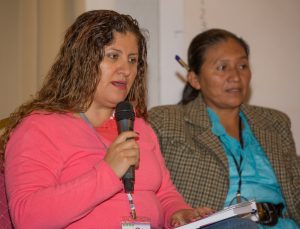 se power over critical land-use decisions. In El Salvador, the peace accords dealt with the warring parties, but left out huge issues for civil society—issues critical for rebuilding communities. In Guatemala, the problem of incomplete implementation continues to plague society.
se power over critical land-use decisions. In El Salvador, the peace accords dealt with the warring parties, but left out huge issues for civil society—issues critical for rebuilding communities. In Guatemala, the problem of incomplete implementation continues to plague society.
In all cases, the role of women has been undervalued and the spaces provided for our participation have been limited. Many participants repeated their experience that peace agreements look good on paper, but the challenges of implementation and of understanding and dealing with new forms of conflict typically fall to vulnerable communities with scarce political and financial resources as global attention turns away. In particular, women’s rights either fall into a category of “we’ll get to that later” or simply vanish from the agenda.
Women cannot choose to remain outside these conflicts; what we can choose is the form of insertion. We have chosen to be involved in the conflicts that engulf our lives not as victims or enablers, but as agents of transformation.
International frameworks are insufficient for broadening and deepening women’s role in peace-building. Even with the advances of UN Security Council Resolution 1325 and increased awareness of the need to integrate women into negotiations at every level, women are often ignored. The first day of the Antigua meeting marked the 17th anniversary of UN Resolution 1325 on Women, Peace and Security that reaffirmed women’s role in “prevention and resolution of conflicts, peace negotiations, peace-building, peacekeeping, humanitarian response and post-conflict reconstruction”. It’s a broad definition of activities, but in application we found that most of our work falls through the cracks. For example, Swarna Rajagopalan from Chennai, India, writing about the Antigua meeting in the New Indian Express, stated that UN Security Council Resolution 1325 applies to traditional conflict contexts and member states, and leaves out many of the kinds of conflict Latin American and Asian women face. She argues for applying the same principles 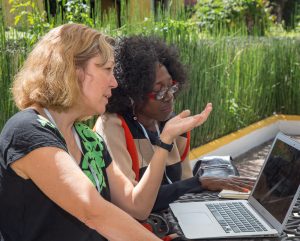 for women’s participation to non-traditional conflicts: “…One could easily argue that the pillars of 1325 are relevant and useful even where conflicts are about land and resources, or militarisation has altered the nature of politics, or where sexual and gender-based violence are endemic. Whether the activists are from the Americas or from Asia, all of us seek, for women and other marginal groups, voice, vote and a gender-just vision of a sustainable peace.”
for women’s participation to non-traditional conflicts: “…One could easily argue that the pillars of 1325 are relevant and useful even where conflicts are about land and resources, or militarisation has altered the nature of politics, or where sexual and gender-based violence are endemic. Whether the activists are from the Americas or from Asia, all of us seek, for women and other marginal groups, voice, vote and a gender-just vision of a sustainable peace.”
Forms and dynamics of violence against women are part of larger structures. Imelda Marrufo explained how in her city of offshore assembly plants, women are viewed as disposable, “They often consider us disposable objects and this is associated with the maquiladoras, the export factories, because we live on the border with the United States and they use a workforce of mostly young women, and we see that just like the maquiladoras throw out parts they no longer need, here the attackers throw out women’s bodies when they don’t serve their purposes any more, sometimes even cut up in parts.” Miriam Pixtun of La Puya observed how centuries of racist and patriarchal attacks on indigenous peoples and cultures under with the imposition of capitalism have led to a point where “we have internalized a lot of it because we’ve been victims of this process of assimilation for so long.” Intersections of patriarchy, capitalism and racism wove naturally through the talks, not as theories of oppression but as the forces we fight against every day of our lives.
Organization can mean the difference between life and death. All the women who participated in the Dialogue lead grassroots organizations in their cities or towns or on the national level. Some are women’s organizations and some are mixed and many participate in both. They described the central value of organization to increase women’s safety, power and leverage in society. Organization gives greater access to the formal political sphere and to the media. The existence and persistence of women’s organizations makes it much harder to sideline women’s demands. Women’s groups throughout the hemisphere have achieved a seat at the table and placed women’s issues on the table, when otherwise they would have been absent.
Where government cannot be relied on to guarantee rights and security, autonomous forms of organization have led to major gains in security. Colombian women have been able to confront crime in their neighborhoods through strong neighborhood associations led by women, and organized Mexican women have developed security plans for the most violent cities from a feminist human security perspective. The Salvadoran feminist collective has gained support from local government forces to carry out house-to-house educating on domestic violence that lowers rates of violence, and in the formation of women human rights defenders in the police force.
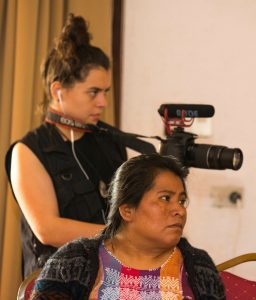 We have answers. The examples above illustrate another important conclusion: we have answers, and are quietly forging alternative paths to real security and peace but at great personal risk. Women are participating and leading long-term projects that reject militarization and force vs. force as a strategy, and develop community coherence, effective justice, respect for human rights. In the last exercise women described five or more specific strategies they’ve used in their organizations that have worked. Felicitas Martinez, Me’Phaa indigenous woman from the state of Guerrero, Mexico and a leader of the grassroots indigenous community police stated, “We have to share the details of these experiences, document how to do things, going back to our history if we have to. We need to know how to replace harmful practices with better ones.” Her organization is a good example: after developing a community police force, linked directly to an autonomous traditional justice system, the communities have been able to significantly decrease the crime and violence of cartels in the zone.
We have answers. The examples above illustrate another important conclusion: we have answers, and are quietly forging alternative paths to real security and peace but at great personal risk. Women are participating and leading long-term projects that reject militarization and force vs. force as a strategy, and develop community coherence, effective justice, respect for human rights. In the last exercise women described five or more specific strategies they’ve used in their organizations that have worked. Felicitas Martinez, Me’Phaa indigenous woman from the state of Guerrero, Mexico and a leader of the grassroots indigenous community police stated, “We have to share the details of these experiences, document how to do things, going back to our history if we have to. We need to know how to replace harmful practices with better ones.” Her organization is a good example: after developing a community police force, linked directly to an autonomous traditional justice system, the communities have been able to significantly decrease the crime and violence of cartels in the zone.
The WRN notes that research has shown that peace agreements reached with women’s full and equal participation are more sustainable than those that exclude women from the process. Whether it’s part of a formal process or not, women’s participation in peace-building is key to creating sustainable peace.
By the close of the last day and at the foot of an active volcano, a consensus had emerged. It took the commission of participants only a few minutes to draw it up. The Antigua declaration states:
1. Peace is only possible in the context of human security, understood as a state of full access to human rights for all.
2. Human rights, viewed from the rich diversity of women’s identities, should be the basis for our analysis and strategies to build peace.
3. Women human rights defenders, as peace builders, are essential in any national and international dialogue that seeks to advance efforts toward peace. They must be granted full access and participation in all peace talks..
4. Building peace is defending life. We defend a concept of human security that puts life and human needs at the center, in contrast to national security policies, which are based on militarization and force as the only tools for achieving peace.
5. We recognize the points of convergence and the points of difference among the regions, countries and communities where women peace-builders live and work, and understand that peace is built based on the many ways we convert our individual experiences into collective action.
You build real security not at the point of a gun, but through stronger and more just human connections.
The meeting left a big agenda for future actions, but we’ve already forged paths of mutual support. The group sent a letter in support of justice in the assassination of Honduran feminist and environmental activist Berta Caceres. We also drafted and signed a letter calling for a feminist human security approach to disaster relief in Puerto Rico, where basic services have still not been restored, women’s right to safety are being shunted aside and the army continues to patrol the streets.
Members of the dialogue agreed to turn the first meeting into an on-going collective for Women, Human Security and Sustainable Peace. The next task is to produce a report that can be shared among the participants and with others, to deepen the vision what a feminist human security framework looks like and how to implement it. Some of our regions desperately need delegations to visit and document the violence and women’s responses, to build solidarity and strengthen local organizations that are in grave danger. Others need investigation, research, and analysis. Others are involved in national and international campaigns for justice that should be broadened.
And we all need to maintain the friendships we made in the time together–bonds that made it possible to intersperse intense discussions of threats and sad stories with laughter, joy and love. Because the basic premise is that you build real security not at the point of a gun, but through stronger and more just human connections.

